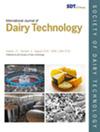Optimisation of natural transformation procedure and development of genome editing methods for Streptococcus thermophilus B-6
Abstract
Background
Streptococcus thermophilus is invaluable in both dairy factory and scientific research, with diverse strains offering unique industrial advantages. Consequently, there is a high demand for efficient, user-friendly, biosafe and broadly applicable genome editing methods for this bacterium. The conventional approach based on temperature-sensitive plasmids is laborious and time-consuming, while the existing natural transformation method lacks broad applicability. The recently developed endogenous CRISPR-Cas-assisted genome editing system involves cumbersome plasmid construction.
Aim
In this study, we aimed to optimise natural transformation protocols and develop efficient, user-friendly, biosafe and broadly applicable genome editing methods for S. thermophilus.
Methods
We used S. thermophilus B-6 as a model strain. We characterised the features of the growth curves and the natural competence of this strain. Accordingly, we optimised the natural transformation protocol for this strain. We used this model strain to develop efficient, user-friendly, biosafe and broadly applicable genome editing methods.
Major Findings
By continuously implementing ComS17–24 and exogenous DNAs, as well as elongating the co-incubation time, we upgraded the transformation ratio of this strain from ~10−5 to ~10−2. Leveraging this improvement, we developed a rapid, simple, biosafe and plasmid-free genome editing method for S. thermophilus. Furthermore, we established a novel endogenous CRISPR-Cas-assisted and efficient genome editing pathway that eliminates the need for additional plasmid construction. Using these advanced techniques, we successfully generated multiple CRISPR-Cas system deleted strains and a recA overexpressing strain.
Scientific and Industrial Implications
Our findings contribute to better understanding the features of natural competence. Our convenient and biosafe genome editing methods will be valuable for most of the S. thermophilus strains and will contribute to the germplasm improvement in the dairy industry. Additionally, the mutant strains generated in this study will serve as valuable resources for future investigations regarding cellular metabolism.


 求助内容:
求助内容: 应助结果提醒方式:
应助结果提醒方式:


